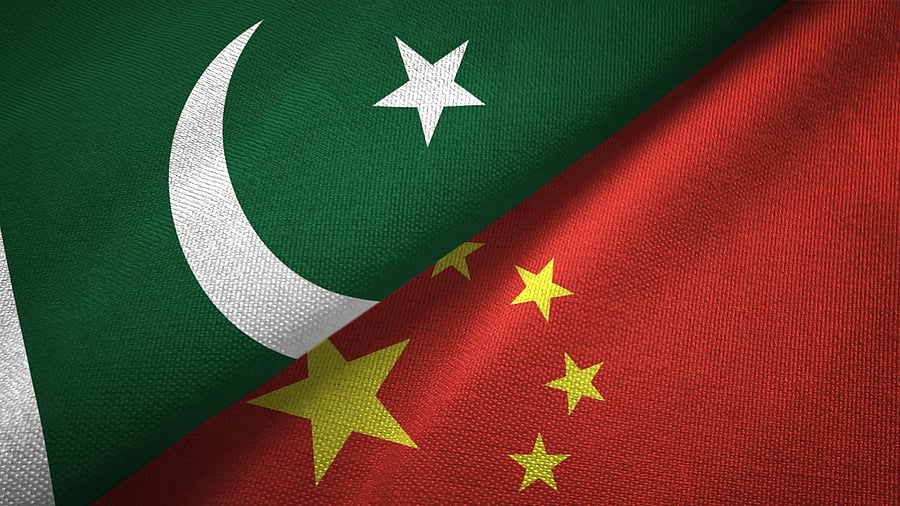
Representative image showing Pakistan and China's national flags.
Credit: iStock Photo
China, it appears, has successfully negotiated with both Pakistan and Myanmar to allow its security and military personnel to operate in the two countries as part of a concerted effort to protect its economic interests and nationals. The difference is that the talks involving Pakistan have made big news. In both cases, China has proposed a Joint Security Committee and cross-posting of their personnel to deal with threats to their respective interests, as and when they arise. The Chinese demand is not new and follows a spate of attacks on its nationals working in Pakistan. Two Chinese engineers were killed in a car bombing in Karachi last month.
In the past, China had on several occasions proposed to Islamabad that their security personnel, either government-controlled or private, be deployed in Pakistan to provide security to their interests and nationals working in projects under the China-Pakistan Economic Corridor (CPEC). That explains the proposal for a Joint Security Committee to establish a Chinese presence in Pakistan. That Pakistan’s Interior Ministry has issued a statement claiming that a joint strategy would soon be evolved to prevent attacks on Chinese nationals is by itself an admission of Pakistan’s inability to tackle the problem.
A minor digression to Myanmar is necessary to understand Chinese interests there. With Senior General Min Aung Hlaing having visited China, Beijing will be hoping to push its case for stability as conflict is affecting its economic and strategic interests, most importantly the oil and gas pipeline from Kunming in Yunnan to Kyaukpyu Port in Myanmar. The Irrawaddy reported that on October 22, the military-led government formed a working committee to prepare a Memorandum of Understanding to establish a joint security company, indicating that private security contractors from China will sign the MoU, allowing them to operate in Myanmar. The committee will scrutinise the import and regulation of weapons and special equipment. Once the MoU is signed, the security company will take over these functions, but it will be a joint effort. Apart from the import of weapons, the company will also deal with communications devices and restricted tools.
Pakistan signing a similar MoU is a distinct possibility. But recall that in the past, driven by Chinese exhortations, Pakistan created a Special Security Division only to protect Chinese nationals working in Pakistan and the assets installed and owned by Beijing in Pakistan. This division was raised in 2017, primarily to protect Chinese interests, but the very nature of CPEC precludes the provision of complete security and that is why attacks on Chinese nationals have continued, especially in Balochistan. On one occasion, a senior ISI official was summoned to Beijing to explain the failure of Pakistani agencies to provide intel ahead of the attacks.
Preventing attacks a geopolitical necessity
China’s issues with Pakistan over the Karachi attack stem from investigations that have revealed insider help for the attack. The proposal is for both countries to send their experts and soldiers for counter-terrorism duties as and when required. The practical aspects of this exchange need to be worked out. However, the larger question has to be – is Chinese presence welcome in Pakistan? This is unlikely as in the past, successive governments have baulked at the idea of allowing Chinese security personnel on Pakistani soil. This time around too, the sentiment against the proposal remains strong, even as reports of joint counter-terrorism exercises emerge.
There are over 3,500 Chinese nationals working in Pakistan under various CPEC projects. Working, for example, in hydropower projects in remote areas in Balochistan and Khyber Pakhtunkhwa (KPK) is difficult and makes Chinese nationals vulnerable to attacks, particularly when on the move. In March this year, five Chinese engineers were killed in a suicide attack on their vehicle headed to the Dasu hydropower project in KPK. In 2021, nine Chinese nationals were killed in a bus bombing when they were on their way to the project site.
The authorities are alert to the possibility of more attacks on Chinese nationals by the Baloch freedom fighters and an escalation will further strain relations with China. For a Pakistan that is ever more reliant on China to bail it out economically, it is embarrassing to be faced with a string of attacks on Chinese nationals. Whether or not the narrative on this front will change with the presence of Chinese security personnel on Pakistani soil is yet to be known. In strategic terms, this means Pakistan is going further deep in its dependence on China.
(The writer is a former director, National
Security Council
Secretariat)